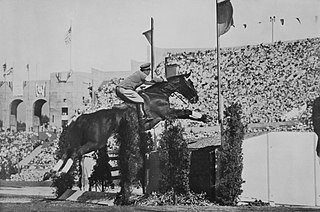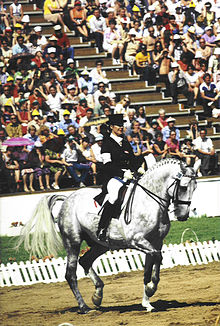Equestrian competitions at the 1968 Summer Olympics in Mexico City, Mexico featured team and individual competitions in show jumping, eventing, and dressage. Mexico City proved a challenging site since it was 2,300 meters above sea level, resulting in 30% less oxygen in the air. The horses at the 1955 Pan American Games, which was also held in Mexico City, arrived a few weeks before the Games to adjust, but had difficulty in the competition. However, racehorses that competed at the same location and who were shipped in the day before, and left the day after the race, performed fine. It was discovered that although horses would adjust immediately to the high altitude during the first few days after arrival, they showed weakness and decreased performance around Day 10, which continued to Day 20. Therefore, nations were advised to ship in horses 3–4 weeks before the competition, which would allow them time to recover from the long travel, as well as adjust to the difference in altitude. Argentina, Ireland, and the USSR were the first to ship horses over, who arrived mid-September. France and Germany were the last countries to send their horses, who arrived 28 September 20 days before the competition was to start.

The equestrian program at the 1912 Summer Olympics in Stockholm, included five medal events. There were individual competitions in dressage, eventing, and show jumping. Team scores were also gathered and medals awarded for teams in the eventing and jumping competitions. Equestrian had been absent from the Olympic program since the 1900 Summer Olympics, making the 1912 Games the second time the sport was featured. Ten nations competed: Belgium, Chile, Denmark, France, Germany, Great Britain, Norway, Russia, Sweden, and the USA. Only Sweden and Germany were able to supply a full team for all three disciplines, with several countries having several riders and horses used in two or even all three disciplines. A total of 88 entries ran in the three events, with 62 riders and 70 horses.
The equestrian events at the 1924 Paris Olympics included eventing, show jumping and dressage. Vaulting was not included this year. The competitions were held from 21 to 27 July 1924. 17 nations fielded teams: Austria, Belgium, Bulgaria, Czechoslovakia, Denmark, Finland, France, Great Britain, Italy, the Netherlands, Poland, Portugal, Spain, Sweden, Switzerland, USA, and Yugoslavia, with Germany not being invited. Of those 17 countries, only 5 fielded teams in all 3 disciplines: France, Sweden, Belgium, Switzerland and Czechoslovakia. A total of 97 entries and 126 horses competed. Horses in both the jumping and eventing competitions were required to carry at least 75 kilograms (165 lb).

The equestrian events at the 1928 Summer Olympics included dressage, eventing, and show jumping. All three disciplines had both individual and team competitions. The competitions were held from 8 to 12 August 1928. Teams were now fielded by three riders, rather than four, the purpose being to reduce pressure on national federations to find that many riders in order to compete for team medals. Riders had to be considered amateurs, which was defined as either an actively serving professional officer, or as a gentleman rider as defined by the rules of that rider's national governing body. A total of 113 entries were present from 20 nations: Argentina, Austria, Belgium, Bulgaria, Czechoslovakia, Denmark, Finland, France, Germany, Hungary, Italy, Japan, the Netherlands, Norway, Poland, Portugal, Spain, Sweden, Switzerland, and the USA. This was the first appearance for Hungary, Japan and Argentina in equestrian events at an Olympics. Additionally, after being shut out from two Olympic competitions, Germany also returned to the Games to win a few medals in the equestrian events.

The equestrian events at the 1932 Los Angeles Summer Games included dressage, eventing, and show jumping. The competitions were held from 10 to 14 August 1932. Due to the Great Depression, only 31 entries from 6 nations competed—which was to be the lowest participation of any Olympic Games.

The equestrian events at the 1936 Berlin Summer Olympics included dressage, eventing, and show jumping. All three disciplines had both individual and team competitions. The host country, Germany, had a stellar year, winning both individual and team gold in every equestrian event, as well as individual silver in dressage. The competitions were held from 12 to 16 August 1936. Moderately priced tickets meant huge crowds at all equestrian events, with 15,000–20,000 spectators at any time during the dressage competition, 60,000 on the endurance day of eventing, and 120,000 for the Nations Cup in jumping.
The equestrian events at the 1976 Summer Olympics in Montreal included show jumping, dressage and eventing. All three disciplines, except for the Nations Cup, were held at the equestrian stadium in Bromont, which had a capacity of 15,000 spectators, and the cross-country and steeplechase were also nearby. Building this stadium provided some headache for the Organizing Committee after the original estimate of 1 million Canadian dollars increased to CAD 4,425.
The equestrian events at the 1948 London Summer Olympics included dressage, eventing, and show jumping. All three disciplines had both individual and team competitions. The competitions were held from 9 to 14 August 1948, with the first five days held in the military complex at Aldershot, the endurance day on the army grounds of Aldershot at Tweseldown, and the jumping at the Empire Stadium in Wembley. World War II resulted in a greatly reduced number of competitors, including the absence of Germany, although Brazil made its first appearance in the equestrian events. 103 entries from 17 nations competed. The youngest participant was Aëcio Coelho from Brazil at 23 years old, while the oldest rider was the Italian Alessandro, Count Bettoni Cazzago, at 55 years old.

The equestrian events at the 1952 Helsinki Summer Olympics included dressage, eventing, and show jumping. All three disciplines had both individual and team competitions and were held from 28 July to 3 August 1952.
The equestrian events at the 1956 Summer Olympics were held in Stockholm due to the Australian quarantine regulations and included dressage, eventing, and show jumping. All three disciplines had both individual and team competitions. The competitions were held from 11 to 17 June 1956 at Stockholm Olympic Stadium. There were 158 entries from 29 National Olympic Committees: Argentina, Australia, Austria, Belgium, Brazil, Bulgaria, Cambodia, Canada, Denmark, Egypt, Finland, France, Germany, Great Britain, Hungary, Ireland, Italy, Japan, Netherlands, Norway, Portugal, Romania, Soviet Union, Spain, Sweden, Switzerland, Turkey, USA and Venezuela. This would be the first appearance for Australia, Cambodia and Venezuela in equestrian events.
The equestrian events at the 1972 Summer Olympics in Munich included show jumping, dressage and eventing. All three disciplines had both individual and team competitions. The equestrian competitions were held at 3 sites: an existing equestrian facility at Riem for the individual show jumping and eventing competitions, the Olympic Stadium in Munich for the Nations Cup, and Nymphenburg, a Baroque palace garden, for the sold-out dressage. 179 entries, including 31 women, competed from 27 countries: Argentina, Australia, Austria, Belgium, Bolivia, Bulgaria, Brazil, Canada, Chile, Denmark, German Democratic Republic (GDR), France, Federal Republic of Germany (FRG), Great Britain, Hungary, Ireland, Italy, Japan, Mexico, the Netherlands, Poland, Portugal, Soviet Union, Spain, Sweden, Switzerland, and the USA. The youngest participant was Kurt Maeder from Switzerland at 19 years old, while the oldest rider was Lorna Johnstone from Great Britain at 70 years old.

The equestrian events at the 1964 Summer Olympics in Tokyo included show jumping, dressage and eventing. All three disciplines had both individual and team competitions. The competitions were held from 16 to 24 October 1964. These events took place at Karuizawa, which would become the first city to host Summer and Winter Olympic event when it hosted the curling events for the 1998 Winter Olympics in Nagano.

Equestrian sports were first included in the Olympic Games in the Summer Olympics of 1900 in Paris. They were again included in 1912, and have been included in every subsequent edition of the Games. The Olympic equestrian disciplines are dressage, eventing, and show-jumping. In each discipline, both individual and team medals are awarded. Women and men compete on equal terms.
Equestrian competitions in all three disciplines at the Beijing 2008 Summer Olympics were held from 9 August to 21 August at the Hong Kong Sports Institute and Sheung Yue River in Hong Kong. It was the second time that the equestrian events were hosted by a member of the IOC other than the member hosting the main games. Unlike 1956, however, the equestrian events were part of the main games, and were held within the same period.

The Equestrian events included three disciplines: dressage, eventing, and show jumping, and were held at the Deodoro Military Club.
The equestrian events at the 2012 Olympic Games in London were held between 28 July and 9 August at Greenwich Park. Medals were awarded in three disciplines for both individual and team competitions.
The equestrian events at the 2016 Summer Olympics in Rio de Janeiro were held between 6 and 19 August at National Equestrian Center in Deodoro. Medals were awarded in three disciplines for both individual and team competitions.
The equestrian events at the 2020 Summer Olympics in Tokyo featured three disciplines for both individual and team competitions.

The individual dressage at the 1980 Summer Olympics took place on 31 July and 1 August at the Trade Unions' Equestrian Complex.
The equestrian events at the 2024 Summer Olympics in Paris are scheduled to run from 27 July to 6 August at the Palace of Versailles, featuring 200 riders across three disciplines for both individual and team competitions, namely dressage, eventing, and jumping.













